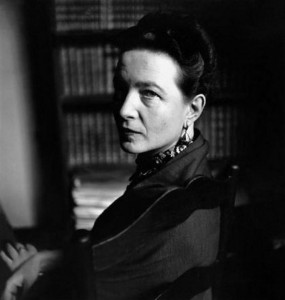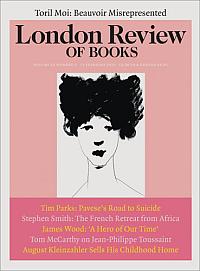My life was hurrying, racing tragically toward its end. And yet at the same time it was dripping so slowly, so very slowly now, hour by hour, minute by minute. One always has to wait until the sugar melts, the memory dies, the wound scars over, the sun sets, the unhappiness lifts and fades away.
Not from Second Sex, but from The Woman Destroyed. But so good, right?
“The body is not a thing, it is a situation: it is our grasp on the world and our sketch of our project”, Simone de Beauvoir did write in Le Deuxieme Sexe, her seminal text widely acknowledged as the founding treatise of modern feminism and a staple of women’s undergrad backpacks everywhere. The book was un scandale when it was released in 1949, shocking readers with the appalling contention that the wife/mother destiny was a myth devised by men to deny women freedom, and rejecting notions like the “maternal instinct” (ideas cemented by Ira Levin 20 years later in his seminal feminist treatise The Stepford Wives). Despite of, or on account of, being viciously attacked by critics and banned by the Vatican, Le Deuxieme Sexe was a humongous hit, selling more than 20,000 copies in France in its first week.
The English translation, first published in this country by Alfred A. Knopf/Random House in 1953 was – naturellement – a smash best seller and sold over a million copies. Sadly, those million English speaking readers have been reading a bargain basement translation, written by a 1950’s man and a Zoologist to boot (Howard Madison Parshley). In the 1980’s, Scholars of de Beauvoirs exposed Zookeeper Parshley’s translation as riddled with mistakes and misunderstandings of philosophical terms obviously reflective of Parshley’s outdated male mindset. It was widely acknowledged that the zookeeper’s translation reinvented de Beauvoir’s ideas of woman’s assertion of herself as a subject as platitudes, implying women are incapable of being objective. Duke Professor and author of Simone de Beauvoir: The Making of an Intellectual Woman, Toril Moi, was particularly aghast, suggesting that when Parshley encountered existentialist terms for existence — such as pour-soi, or ‘‘being-for-itself” — vis-à -vis women’s lives, he tended to render them as woman’s ‘‘true nature’‘ or feminine ”essence,” in other words, de Beauvoir’s bête noire. ”The idea of existentialism is ‘experience precedes essence.’ Existentialism means ‘You are what you do,’ ” said Moi. It seems Parshley had been hired based on his experience as a writer specializing in reviewing books about sex and not for his proficiency in existentialism. Or French. Â
Moreover, the beleagured zookeeper was forced to cut at least 10 per cent of de Beauvoir’s original text, excising many of de Beauvoir’s accounts of exceptional women in history. After reading the critiques, Beauvoir said: ‘I was dismayed to learn the extent to which Mr Parshley misrepresented me. I wish with all my heart that you will be able to publish a new translation of it”. They didn’t. Random House continued to deny that the translation was flawed and de Beauvoir died in April 1986 without her wish being granted. Combien gentil.
Fact: Weeks after the publication of his translation of The Second Sex -which coincided with the completion of his translation of a French zoology book on mammals (sigh) – Parshley had a heart attack and died.
Last year, Random House announced that a new translation was finally being commissioned. This time they bi-passed the zoo and hired two former teachers and accomplished cook book writers – Constance Borde and Sheila Malovany-Chevalier – to translate the new, highly anticipated edition. A curious choice, given the scrutiny that the new translation was guaranteed to be given. Second Sex, 2.0 was published last month and was immediately eviscerated all over again. Toril Moi again came out, guns blazing, in a scathing review in the London Review of Books where she implies that the cookbook writer’s version is actually worse than the zookeeper’s because it’s tonally off and (horreurs!) boring.
An excerpt from Toril Moi’s devastating critique of the new translation:
The Adulteress Wife
Toril Moi
The Second Sex by Simone de Beauvoir, translated by Constance Borde and Sheila Malovany-Chevallier Cape, 822 pp, £30.00, November 2009, ISBN 978 0 224 07859 7
The translators claim that their aim was to bring ‘into English the closest version possible of Simone de Beauvoir’s voice, expression and mind’. The ambition is laudable, but the result is what Nabokov, a great champion of literal translation, called ‘false literalism’ (as opposed to ‘absolute accuracy’). The obsessive literalism and countless errors make it no more reliable, and far less readable than Parshley.
And:
Whenever I try to read Borde and Malovany-Chevallier’s translation like an ordinary reader, without constantly checking against the French, I feel as if I were reading underwater. Beauvoir’s French is lucid, powerful and elegantly phrased. Even in Parshley’s translation young women would devour The Second Sex, reading it night and day. It’s hard to imagine anyone doing that with this version.
Ouch.
Read the entire review here.
citation:
Moi, Toril. “The Adulteress Wife.” Rev. of The Second Sex, by Simone de Beauvoir, translated by Constance Borde and Sheila Malovany-Chevallier. London Review of Books 32.3 (2010): 3-6. 19 Mar. 2010 .



